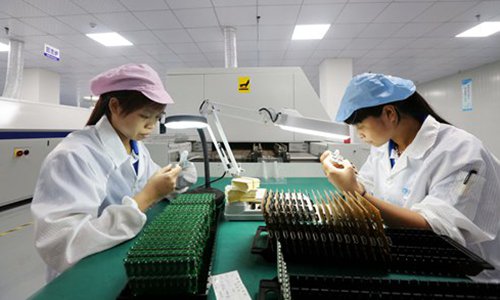HOME >> BUSINESS
Think tank analysts speak out against US unilateralism, trade war
By Chen Qingqing Source:Global Times Published: 2019/6/20 22:23:40

Workers check on the quality of integrated circuits at a factory in Guigang, South China's Guangxi Zhuang Autonomous Region in July. Photo: VCG
Analysts from a top think tank advising Chinese policymakers have spoken against the US-led trade war, which will eventually create financial chaos and market turbulence. Some suggested China should continue to upgrade its industries to remain competitive in global supply chains, which will be the biggest victory card in the escalating trade war.
Upgraded manufacturing with a further integrated supply chain is China's largest winning card, and unlocking the full potential of the supply chain will also be fundamental in gaining leverage in the escalating trade war, a former Chinese mayor told a conference focusing on China-US relations on Thursday.
Global supply chains are highly integrated, Huang Qifan, former mayor of Southwest China's Chongqing Municipality and vice chairman of the China International Economic Exchange Center, said at the conference. "Take chip production as an example. From chipset design to the operating system and software design, companies from different countries are closely working together and you can't tell which is made in the US or China or in other countries," he said, noting that integration of supply chains is a major driving force of globalization. This process is also bridging industries across the globe.
China has a dominant position in global supply chains, and the further development and integration of supply chains is our biggest victory card in the trade war, Huang said.
The ongoing trade war has already disrupted supply chains, and some multinational companies have been considering relocating factories out of China to avoid more tariffs. The former mayor said that China still possesses the most comprehensive and appropriate supply chains with relatively low costs in each segment, helping the country play the most important role in global value chains.
Analaysts from the Chinese Academy of Macroeconomic Research (AMR), a top think tank affiliated with the National Development and Reform Commission, the country's top economic planner, also voiced concern that the trade war led by the US might trigger another global recession and hurt fair market-based rules.
"Trade friction has intensified global market turbulence, which may lead to systemic financial risks on the regional and global scales," said Zang Yueru, an analyst of the AMR, said during the conference.
The US is recklessly breaking global trade rules and this has weakened countries' ability to face any potential financial crisis, she said.
In addition, contrary to the spirit of contract, the US is destroying the existing global market fair trading system.
Washington taking a unilateral stance and exerting extreme pressure on other countries has also agitated the foundations of the US economy, which will make the world less trusting in the country, analysts warned.
"The power of the US is built on the attraction of global talent and the dominance of the US dollar-denominated financial system. But rising new McCarthyism is scaring people away," said Ye Fujing, director of the Institute for International Economic Research under the NDRC.
While more countries feel the urgency of de-dollarization, countries, especially some of its allies, are disgusted with US interference in their internal affairs and crackdown on trade issues, he noted.
Posted in: INDUSTRIES